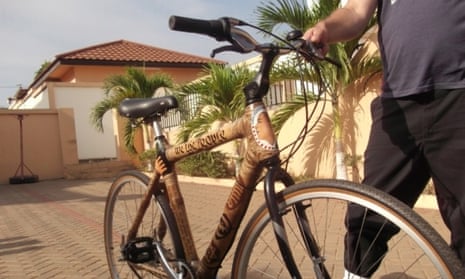The business leaders of tomorrow will be responsible for tackling huge challenges, from climate change to growing inequality. Aware of the dangers these issues pose if they are not faced head on, these three leaders see sustainability as a fundamental pillar of good business. From building bamboo bikes to making Coca-Cola more sustainable, they hope to improve on the world their parents are leaving behind.
Bernice Dapaah, executive director, Ghana Bamboo Bikes

Bernice Dapaah has ridden an unlikely path to success. In Ghana, a country beset with traffic congestion and a stark urban-rural divide, Dapaah settled on making bicycle frames out of bamboo as a route to promoting sustainable development.
The idea was to help rural people gain access to local and international markets with their finished products. The project has since created direct employment for 10 farmers and 20 bamboo bike assemblers, who are paid more than most other Ghanaians. These 30 people support households with an average of five members. In addition, 25 rural women and disabled people in two other communities, who would otherwise be out of a job or below the poverty line, have been taught to make the bamboo bike frames and now form part of the supply chain. As well as supplying foreign markets, the bikes are an affordable transport option for local people including farmers, health workers and school children.
One of the World Economic Forum’s Young Global Leaders, Dapaah, 34, says that although the project is a success, she still has to fight to get her voice heard. “In my culture, where age and gender impact on social status, being young and a woman is sometimes difficult, especially when meeting potential clients or business partners who can be judgmental. However, this has never stifled my potential or discouraged me. It’s the importance of sustainability for our future that keeps driving me to overcome these sorts of obstacles,” she says. “Sustainability should be integrated into every aspect of our lives. Businesses should be accountable for the indirect unintended consequences of supply and consumption.”
Olivia Knight-Adams, environment manager, Coca-Cola Company

Olivia Knight-Adams, 36, has packed a lot into her career so far, with jobs in sustainability spanning the charity, government and business sectors. These have taken her across the globe, from the depths of the ocean around the Maldives where she worked as a marine biologist, to South America where she managed community and conservation projects and expeditions. More recently she landed in London’s Stratford East, as sustainability adviser to the Olympic Delivery Authority.
That position led to her current job as Coca-Cola’s environmental manager, where she worked in its London 2012 sustainability team and now concentrates on sustainable sourcing and supply chain management. So how does she ensure she can deal with the global challenges she faces in her career? “By having an insatiable appetite to learn more, share more and find new ways to collaborate, understanding the validity in people’s varying agendas, especially those you don’t agree with, and devising better ways to communicate solutions,” she says.
It helps, too, that she is driven by a firm belief in sustainability as the model for global development. “Sustainability can no longer be an add-on, as a stand-alone department of any business or political party. It needs to be the very essence of how an organisation operates. We need more sustainability-literate leaders across all facets of society who can overcome the short-termism of governments and political parties, develop innovative new business models and generate enough urgency on a big enough scale to tackle the local and global challenges we all face.”
Will Dawson, head of energy, Forum for the Future

Will Dawson, 34, heads up the energy team at the sustainability non-profit Forum for the Future. He focuses on changing the ways that energy is generated and used, so we produce more from local renewable sources and waste less.
Community action, he says, is key. “Sustainability in the future won’t be a term we use a lot. Protecting the interests of future generations is a natural part of humanity and is as old as our species. I believe that social networks will diminish this temporary blip in the power of political parties and companies, and lead to changes that will make life better for billions.”
His team founded the Community Energy Coalition, which comprises 36 organisations, to campaign for better conditions for communities generating and saving energy together locally. Part of this work involved designing the community feed-in tariff for renewable energy and a right to buy into local commercial wind and solar projects – both of which were included in the first national Community Energy Strategy, which Dawson helped the UK government launch last January.
“The biggest challenge the world faces is to stop wasting money chasing fossil fuels when we know we can’t burn them and instead embrace renewable and efficient alternatives,” Dawson says.
Read more like this:
- Our obsession with heroic sustainability leaders will leave us all disappointed
- 6 reasons CEOs feel powerless to drive sustainability into their companies
- Brought to you by Xyntéo: Paul Polman: ‘We need to leverage the young to drive change’
The leadership hub is funded by Xyntéo. All content is editorially independent except for pieces labelled ‘brought to you by’. Find out more here.
Join the community of sustainability professionals and experts. Become a GSB member to get more stories like this direct to your inbox

Comments (…)
Sign in or create your Guardian account to join the discussion